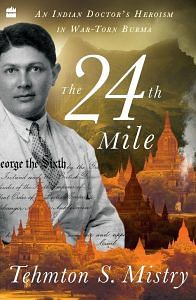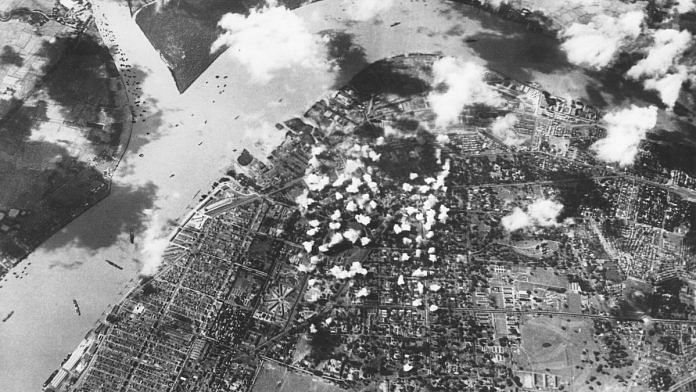At 9 a.m., Jehangir Anklesaria and Sergeant Gordon were sitting outside their room when they saw a uniformed nurse and a white-coated doctor striding towards them. ‘Ranjit Singh told us about you,’ said the nurse, smiling. ‘I am the matron and this is Dr Ponnuru.’ ‘Good morning,’ Jehangir said, and introduced himself and Sergeant Gordon. ‘Hello, and welcome to Monywa,’ the doctor greeted them warmly.
‘I can’t tell you how glad we are that you have come. By the way, I am the assistant district health officer here—such a long name for a very minor post,’ he concluded, laughing.
‘Oh, I don’t know about that,’ Jehangir responded. ‘I am sure you are a very important person, especially these days.’
As he spoke, Jehangir quietly noted the white patches on Dr Ponnuru’s face and hands, the only exposed parts of his body. Vitiligo, he concluded.
Also read: Burma was once toast of the world. Now, it is on list of top 10 places to avoid
‘Come,’ Dr Ponnuru said, ‘let us go to my office and we can talk and have some tea.’ It turned out that Dr Ponnuru was from a small south Indian town near Bangalore. After finishing medical school, he had applied for positions at various places, but each time was turned down in spite of his superior academic credentials—he was a graduate of the Christian Medical College in Vellore. ‘They didn’t like my looks,’ he explained jokingly, ‘so I decided to try my luck in Burma.’
‘Well, all I can say is, their loss was Burma’s gain,’ Jehangir said, well aware that the medical college in Vellore was one of the finest in India. Now, Sergeant Gordon addressed Dr Ponnuru.
‘Doctor, on the civilian side, does the government have any plans to handle a sudden influx of thousands of refugees? When the bridge opens, all those people will come through Monywa on their way to the border.’
‘You are absolutely correct, Sergeant; and that’s what keeps me up at night—thinking of ways to avoid a catastrophe. Yes, we have a stock of supplies and medicines to use and we have set aside an isolation ward for the very sick. In fact, we have already seen some cases of cholera. Many more are dying by the roadside. But our resources are limited—the Burmese government is not inclined to spend large sums of money to care for Indians.
‘As for personnel, we keep losing them left and right—they just pack up and leave. But what we really need desperately is someone—’ here, Dr Ponnuru looked directly at Jehangir—‘someone who can bring the military and civilian sides together to improve the camp; we can’t do it alone and I fear there may not be enough time now.’
‘Tell me more about the camp,’ Jehangir probed. ‘Ranjit mentioned it briefly.’
‘Oh yes. Let me tell you the history of this “camp”. Ever since the war began, Indian refugees have been passing through Monywa on their way to Assam in India. The traffic increased after the Rangoon bombing. By the end of January, thousands were coming by train. Conditions became so bad that we had over fifty deaths from the plague.’
‘Go on,’ Jehangir urged, listening intently.
‘Well, at this point, the deputy commissioner, Mr Glass, decided to have a camp constructed. They found a site on the north end of town—a good site, in my opinion—but they haven’t done much to develop it, to say the least. Sanitation is horrible, and the food supply is deficient. The refugees are surviving only thanks to the generosity of two local merchants, Mr Ramkishen and Mr Shukla.
‘And now we are caught between two problems: Mandalay is already full of refugees and cholera has started there too. So the commissioner of Sagaing Division—’
‘Where Monywa is located,’ Jehangir interjected.
‘Exactly. He has forbidden any more refugees to cross the river from Mandalay. And the army has agreed, actually putting up barbed wire on the bridge—’
‘Because?’ Jehangir asked.
‘Because the army is constructing a new road from Kalewa to Tamu on the Indian border, and they can’t build it with a constant stream of refugees along the route.’
Now Jehangir looked knowingly at Sergeant Gordon, remembering what he had learnt in Maymyo. ‘So why are the numbers increasing in Monywa?’
‘Well,’ Dr Ponnuru explained in a resigned tone, ‘they just cross the river by other means—over a thousand of them per day. Which is why we have smallpox and cholera starting here.’ Jehangir listened to the dismal situation, but did not respond right away. All eyes were on him when he finally spoke.
‘Right,’ he said, his tone both assertive and optimistic, ‘I have a commission from the governor and the army. Here,’ he said, handing a paper to Dr Ponnuru, ‘show this to the Burmese authorities. Tell them if they do not release the money immediately, I will report their insubordination to the governor and they will be sacked. Double the pay to your ward boys and nurses—by the way, how many do you have left?’
Dr Ponnuru looked at the matron. ‘We have only three nurses and four ward boys remaining,’ she responded with a sigh.
‘That certainly sounds grim—all the more reason we have to retain them. Matron, spread the word that we are looking for anyone who is willing to care for sick people. They will get free food and lodging and double what they earn elsewhere. Sergeant Gordon and I will go to Army HQ and see what else we can do. In the meantime, Neelam, you can discuss with Matron what supplies we will need for cooking, cleaning and disinfection, especially phenyl and lime. We will meet again at lunchtime. Then, we will visit the camp.’
Also read: When celebrating 50 yrs of 1971 War, don’t forget this life-saving sachet and Bengali doctor
I assume this is a transit camp, since the refugees will be proceeding to the border?’ Dr Ponnuru posed the question in the hospital that afternoon, after the group had visited the camp.
‘I certainly hope so,’ Jehangir replied. ‘Unless they are sick, in which case they will have to stay longer— at the hospital, I assume?’ said Sergeant Gordon.
‘Yes,’ said Jehangir. ‘Now, as far as making specific plans, I suggest we think in terms of prevention first and foremost. If we think of cholera prevention as a three-legged stool, the first leg is inoculation, the second would be sanitation, and the third is isolation.
‘Sergeant, would you like to oversee inoculation?’
‘Yes, I would,’ Sergeant Gordon replied. ‘I think we should have enough serum.’
‘Yes, that was my next point. Dr Ponnuru, we have a supply of serum and intravenous solution arriving here by riverboat, and we’ve already unloaded some from the truck. Can you take charge of storing the supplies in a cool place? We will also need a team of vaccinators—do you have one that Sergeant Gordon can use, starting tomorrow?’
‘We used to have three teams of vaccinators, but we are down to only one now—still, I think we can manage.’
‘Good,’ Jehangir replied, hitting his stride. ‘So starting tomorrow, Sergeant Gordon will set up a roadblock on the main road into Monywa with the help of the army. No one will be allowed into the town without an inoculation. And those who have had the vaccine will be marked with a laundry marker. Next,’ he said, turning to the matron, ‘Will you be able to handle sanitation, Matron? I know it is a tall order, but you will have the army to help you—they will begin digging the trench latrines and wells tomorrow, once we identify the site. And Neelam can also help you since she has worked with cholera patients at Rangoon Hospital.’
‘Yes, I am sure we can work together,’ the matron replied, smiling at Neelam. ‘We located a vendor with a large stock of quicklime and bleach for spreading inside the latrines and we also have a supply of Flit spray for the flies.’ 9o0g
‘Excellent,’ said Jehangir, pleased with his plan of action. ‘Dr Ponnuru, you will, of course, be handling treatment and isolation in the hospital.’
 This excerpt from ‘The 24th Mile: An Indian Doctor’s Heroism in War-Torn Burma’ by Tehmton S. Mistry has been published with permission from HarperCollins India.
This excerpt from ‘The 24th Mile: An Indian Doctor’s Heroism in War-Torn Burma’ by Tehmton S. Mistry has been published with permission from HarperCollins India.



